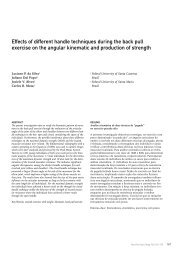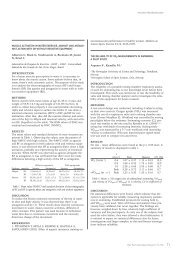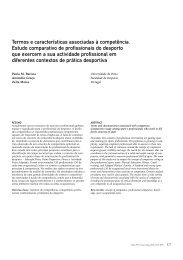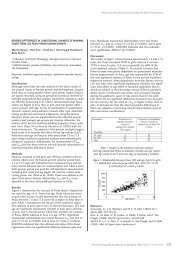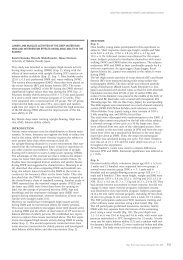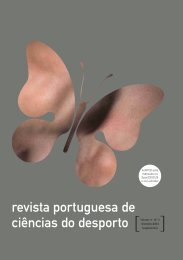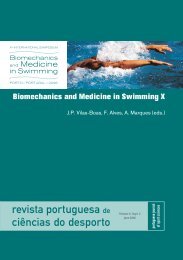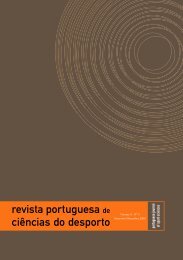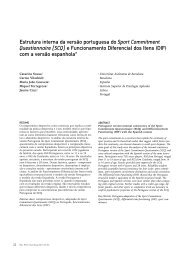download PDF - Faculdade de Desporto da Universidade do Porto
download PDF - Faculdade de Desporto da Universidade do Porto
download PDF - Faculdade de Desporto da Universidade do Porto
You also want an ePaper? Increase the reach of your titles
YUMPU automatically turns print PDFs into web optimized ePapers that Google loves.
Portuguese Journal of Sport Sciences<br />
PUBLICATION NORMS<br />
Working materials<br />
(manuscripts)<br />
Original investigation<br />
The PJSS publishes original<br />
papers related to all areas of<br />
Sport Sciences.<br />
Reviews of the literature<br />
(state of the art papers)<br />
State of the art papers or<br />
critical literature reviews are<br />
published if, and only if,<br />
they contribute to the generalization<br />
of knowledge.<br />
Meta-analytic papers or general<br />
reviews are possible<br />
mo<strong>de</strong>s from contributing<br />
authors. This type of publication<br />
is open only to invited<br />
authors.<br />
Commentaries<br />
Commentaries about published<br />
papers or literature<br />
reviews are highly recommen<strong>de</strong>d<br />
by the editorial<br />
board and accepted.<br />
Case studies<br />
Highly relevant case studies<br />
are favoured by the editorial<br />
board if they contribute to<br />
specific knowledge within<br />
the framework of Sport<br />
Sciences research. The<br />
meticulous control of<br />
research metho<strong>do</strong>logy is a<br />
fun<strong>da</strong>mental issue in terms<br />
of paper acceptance.<br />
Essays<br />
The PJSS shall invite highly<br />
regar<strong>de</strong>d specialists to write<br />
essays or careful and <strong>de</strong>ep<br />
thinking about several<br />
themes of the sport sciences<br />
mainly related to philosophy<br />
and/or strong argumentation<br />
in sociology or psychology.<br />
Book reviews<br />
The PJSS has a section for<br />
book reviews.<br />
General publication rules<br />
All papers submitted to the<br />
PJSS are obliged to have<br />
original <strong>da</strong>ta, theoretical or<br />
experimental, within the<br />
realm of Sport Sciences. It is<br />
man<strong>da</strong>tory that the submitted<br />
paper has not yet been<br />
published elsewhere. If a<br />
minor part of the paper was<br />
previously published, it has<br />
to be stated explicitly in the<br />
acknowledgments section.<br />
All papers are first evaluated<br />
by the editor in chief, and<br />
shall have as initial criteria<br />
for acceptance the following:<br />
fulfilment of all norms, clear<br />
relationship to Sport<br />
Sciences, and scientific<br />
merit. After this first screening,<br />
and if the paper is firstly<br />
accepted, two in<strong>de</strong>pen<strong>de</strong>nt<br />
referees shall evaluate its<br />
content in a “<strong>do</strong>uble blind”<br />
fashion. A third referee shall<br />
be consi<strong>de</strong>red if the previous<br />
two are not in agreement<br />
about the quality of the<br />
paper.<br />
After the referees receive the<br />
manuscripts, it is hoped that<br />
their reviews are posted to<br />
the editor in chief in no<br />
longer than a month.<br />
Manuscript preparation<br />
General aspects<br />
The first page of the manuscript<br />
has to contain:<br />
– Title and author(s)<br />
name(s)<br />
– Declaration that the paper<br />
has never been published<br />
Format<br />
– All manuscripts are to be<br />
typed in A4 paper, with<br />
margins of 3 cm, using<br />
Times New Roman style<br />
size 12 with <strong>do</strong>uble space,<br />
and having no more than<br />
20 pages in length.<br />
– Pages are to be numbered<br />
sequentially, with the title<br />
page as nr.1.<br />
– It is man<strong>da</strong>tory to send 4<br />
copies;<br />
– One of the copies is the<br />
original that has to have<br />
original illustrations.<br />
Size and style<br />
– Papers are to be written in<br />
a very precise and clear<br />
language. No place is<br />
allowed for speculation<br />
without the boun<strong>da</strong>ries of<br />
available <strong>da</strong>ta.<br />
– If manuscripts are highly<br />
confused and written in a<br />
very poor Portuguese or<br />
English they are immediately<br />
rejected by the editor<br />
in chief.<br />
– All abbreviations are to be<br />
used according to international<br />
rules of the specific<br />
field.<br />
Title page<br />
– Title page has to contain<br />
the following information:<br />
– Specification of type of<br />
manuscript (but see workingmaterials-manuscripts).<br />
– Brief and highly informative<br />
title.<br />
– Author(s) name(s) with<br />
first and middle names (<strong>do</strong><br />
not write aca<strong>de</strong>mic <strong>de</strong>grees)<br />
– Running head with no<br />
more than 45 letters.<br />
– Name and place of the aca<strong>de</strong>mic<br />
institutions.<br />
– Name, address, fax number<br />
and email of the person<br />
to whom the proof is<br />
to be sent.<br />
Abstract page<br />
– The abstract has to be very<br />
precise and contain no<br />
more than 200 words,<br />
including objectives,<br />
<strong>de</strong>sign, main results and<br />
conclusions. It has to be<br />
intelligible without reference<br />
to the rest of the<br />
paper.<br />
– Portuguese and English<br />
abstracts are man<strong>da</strong>tory.<br />
– Inclu<strong>de</strong> 3 to 6 key words.<br />
– Do not use abbreviations.<br />
Introduction<br />
– Has to be highly comprehensible,<br />
stating clearly the<br />
purpose(s) of the manuscript,<br />
and presenting the<br />
importance of the work.<br />
– Literature review inclu<strong>de</strong>d<br />
is not expected to be<br />
exhaustive.<br />
Material and methods<br />
– Inclu<strong>de</strong> all necessary information<br />
for the replication<br />
of the work without any<br />
further information from<br />
authors.<br />
– All applied methods are<br />
expected to be reliable and<br />
highly adjusted to the<br />
problem.<br />
– If humans are to be used<br />
as sampling units in experimental<br />
or non-experimental<br />
research it is expected<br />
that all procedures follow<br />
Helsinki Declaration of<br />
Human Rights related to<br />
research.<br />
– When using animals all<br />
ethical principals related to<br />
animal experimentation are<br />
to be respected, and when



